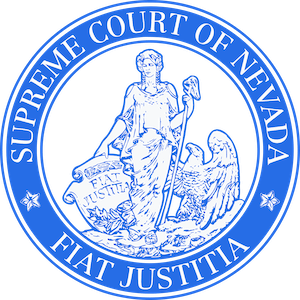Today the Nevada Supreme Court entered an order amending the rules requiring continuing legal education (CLE) to provide Nevada lawyers the opportunity to earn CLE credit for pro bono civil representation and related services for low-income Nevadans with unmet civil legal needs.
Under the amendment to Supreme Court Rule 210, attorneys can earn one (1) CLE credit hour for every three (3) hours of uncompensated legal services up to a maximum of four (4) CLE credit hours per year. Attorneys must perform pro bono hours through a legal aid service organization, court, or governmental program approved by the Supreme Court Access to Justice Commission.
Chief Justice Kristina Pickering and Justice James Hardesty, who co-chair the Nevada Access to Justice Commission, filed a joint petition proposing the rule amendment late last year as ADKT 551. The Supreme Court heard comments in favor of the rule change during an En Banc session on Jan. 23 in Las Vegas.
Speakers who supported the new rule included Paul Matteoni, president, State Bar of Nevada; Patricia Lee, chair, and Noah Malgeri, pro bono project director, Legal Aid Center of Southern Nevada; John Courtney, chair, Nevada Legal Services; Sheri Vogel, executive director, Southern Nevada Senior Law Program; and James Conway, executive director, Washoe Legal Services. In addition, the Access to Justice Commission, Volunteer Attorneys for Rural Nevadans (VARN) and Nevada Board of Continuing Legal Education cooperated on drafting the rule.
A recent report from the Access to Justice Commission, Nevada Statewide Study of Legal Needs and Economic Impacts, found that 76 percent of financially struggling Nevadans have unmet civil legal needs. Many lose their case, not because they did something wrong, but because they did not get the legal help they needed.
Paul Matteoni, State Bar of Nevada president said, “The State Bar supports this positive new initiative allowing our attorney members to obtain continuing legal education credit by assisting persons of limited means.”
Chief Justice Pickering noted that 15 other states have adopted similar rules, acknowledging both the need for pro bono services and the educational value pro bono work provides lawyers. “CLE credit for pro bono volunteer work is a creative and meaningful way to promote access to justice,” Chief Justice Pickering said.
Justice James Hardesty, co-chair of the Access to Justice Commission added, “This is a great opportunity for members of the bar to earn CLE credits by engaging in the practice of law, while helping someone in need.”
To meet this need, the Supreme Court, Access to Justice Commission, and the State Bar of Nevada sponsor the One Campaign aimed at encouraging attorneys to take one pro bono case and help one low-income civil litigant. The Supreme Court expects the amendment to Rule 210 to increase participation in the One Campaign.
The public and attorneys can find more information about pro bono legal services and volunteering at https://nvbar.org/for-the-public/pro-bono-for-the-public/.

